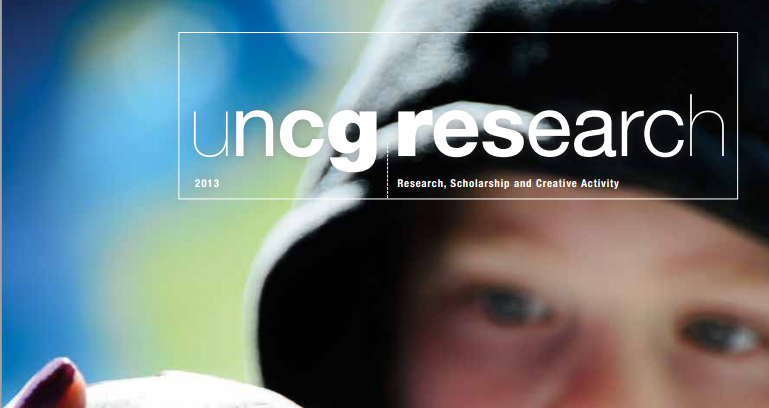This issue of UNCG Research highlights the essential role that research and creative activity play at UNCG. As a civically engaged public research university, UNCG serves as a “steward of place.” Defined as “answering the call to join with public and private partners…to identify problems, explore potential solutions, and test those solutions in real life” (2002 AASCU Stepping Up as Stewards of Place), this stewardship includes a primary responsibility to educate. Far from relegating research to a minor place, the integration of research with teaching and learning and with community and economic engagement propels the research and scholarship of faculty, students and staff into an essential role. Research is critical for teaching our students to be lifelong learners, innovators and tomorrow’s leaders and is vital to helping UNCG fulfill its mission of improving quality of life throughout the city, region, nation and world.
Benefits to Teaching
In addition to providing the content that is taught in university classrooms all over the world, faculty research directly enhances education. The synergy that occurs when research and creative activity are coupled with inspired mentoring and students’ curiosity results in new knowledge and innovation. Dr. Eric Jones’ support of undergraduates conducting anthropological research in Mexico and Ecuador and Dr. Joanne Murphy’s mentorship of students mapping the cultural remains of civilizations in Greece are great examples of this synergy. We want students to learn not just what we know in the various disciplines, but how we come to know it. Encouraging students to imagine and innovate, to test ideas and persist in the face of failure, and to develop original solutions to complex problems is most effectively accomplished when modeled by faculty who are themselves actively involved in research and creative activity.
Generation of New Knowledge
Research results in the generation of new knowledge and plays a critical role in informing what we teach our students today and in the future. Research Excellence professors Dr. Karen Kilcup and Dr. Esther Leerkes provide tangible examples of ways in which research across the disciplines at UNCG contributes to internationally recognized new knowledge and new understandings. Research fosters innovation in virtually every field of human endeavor. UNCG is involved in everything from igniting community passion for the biological diversity of our state and how that informs science education research to innovative approaches to injury rehabilitation in Dr. Chris Rhea’s virtual reality lab. What we do now in research and creative activity will be the key to innovation and prosperity decades into the future.
Benefits to the Community
Research and creative activity contribute to the economic vitality of the community and the state. It puts dollars into the economy and results in marketable products and services that can be patented, licensed or result in spin off companies. It supports businesses by supplementing their own research efforts, especially important for smaller businesses, which may not have access to the personnel or the facilities for a large research enterprise. Research and creative activity at UNCG also contribute to what some have termed the “wisdom economy” — the application of knowledge for the good of humanity. Working in partnership with governments, commerce and society, universities can bring together different perspectives in order to propose solutions to local and global challenges. This benefit to the “wisdom economy” is reflected in the work of faculty such as Dr. Vincent Francisco who is helping to formulate evidence-based public policy to improve the health and vitality of our citizens and their communities.
Whatever the focus, the breadth and variety of scholarship of our faculty and students fully articulate UNCG’s commitment to doing something bigger altogether, thereby fulfilling our role as a steward of place.
Linda P. Brady, PhD
Chancellor
Terri L. Shelton , PhD
Vice Chancellor for Research and Economic Development
